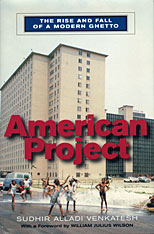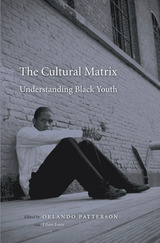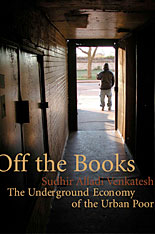
High-rise public housing developments were signature features of the post–World War II city. A hopeful experiment in providing temporary, inexpensive housing for all Americans, the "projects" soon became synonymous with the black urban poor, with isolation and overcrowding, with drugs, gang violence, and neglect. As the wrecking ball brings down some of these concrete monoliths, Sudhir Venkatesh seeks to reexamine public housing from the inside out, and to salvage its troubled legacy. Based on nearly a decade of fieldwork in Chicago's Robert Taylor Homes, American Project is the first comprehensive story of daily life in an American public housing complex.
Venkatesh draws on his relationships with tenants, gang members, police officers, and local organizations to offer an intimate portrait of an inner-city community that journalists and the public have only viewed from a distance. Challenging the conventional notion of public housing as a failure, this startling book re-creates tenants' thirty-year effort to build a safe and secure neighborhood: their political battles for services from an indifferent city bureaucracy, their daily confrontation with entrenched poverty, their painful decisions about whether to work with or against the street gangs whose drug dealing both sustained and imperiled their lives.
American Project explores the fundamental question of what makes a community viable. In his chronicle of tenants' political and personal struggles to create a decent place to live, Venkatesh brings us to the heart of the matter.

The Cultural Matrix seeks to unravel a uniquely American paradox: the socioeconomic crisis, segregation, and social isolation of disadvantaged black youth, on the one hand, and their extraordinary integration and prominence in popular culture on the other. Despite school dropout rates over 40 percent, a third spending time in prison, chronic unemployment, and endemic violence, black youth are among the most vibrant creators of popular culture in the world. They also espouse several deeply-held American values. To understand this conundrum, the authors bring culture back to the forefront of explanation, while avoiding the theoretical errors of earlier culture-of-poverty approaches and the causal timidity and special pleading of more recent ones.
There is no single black youth culture, but a complex matrix of cultures—adapted mainstream, African-American vernacular, street culture, and hip-hop—that support and undermine, enrich and impoverish young lives. Hip-hop, for example, has had an enormous influence, not always to the advantage of its creators. However, its muscular message of primal honor and sensual indulgence is not motivated by a desire for separatism but by an insistence on sharing in the mainstream culture of consumption, power, and wealth.
This interdisciplinary work draws on all the social sciences, as well as social philosophy and ethnomusicology, in a concerted effort to explain how culture, interacting with structural and environmental forces, influences the performance and control of violence, aesthetic productions, educational and work outcomes, familial, gender, and sexual relations, and the complex moral life of black youth.

In this revelatory book, Sudhir Venkatesh takes us into Maquis Park, a poor black neighborhood on Chicago’s Southside, to explore the desperate, dangerous, and remarkable ways in which a community survives. We find there an entire world of unregulated, unreported, and untaxed work, a system of living off the books that is daily life in the ghetto. From women who clean houses and prepare lunches for the local hospital to small-scale entrepreneurs like the mechanic who works in an alley; from the preacher who provides mediation services to the salon owner who rents her store out for gambling parties; and from street vendors hawking socks and incense to the drug dealing and extortion of the local gang, we come to see how these activities form the backbone of the ghetto economy.
What emerges are the innumerable ways that these men and women, immersed in their shadowy economic pursuits, are connected to and reliant upon one another. The underground economy, as Venkatesh’s subtle storytelling reveals, functions as an intricate web, and in the strength of its strands lie the fates of many Maquis Park residents. The result is a dramatic narrative of individuals at work, and a rich portrait of a community. But while excavating the efforts of men and women to generate a basic livelihood for themselves and their families, Off the Books offers a devastating critique of the entrenched poverty that we so often ignore in America, and reveals how the underground economy is an inevitable response to the ghetto’s appalling isolation from the rest of the country.
READERS
Browse our collection.
PUBLISHERS
See BiblioVault's publisher services.
STUDENT SERVICES
Files for college accessibility offices.
UChicago Accessibility Resources
home | accessibility | search | about | contact us
BiblioVault ® 2001 - 2024
The University of Chicago Press









